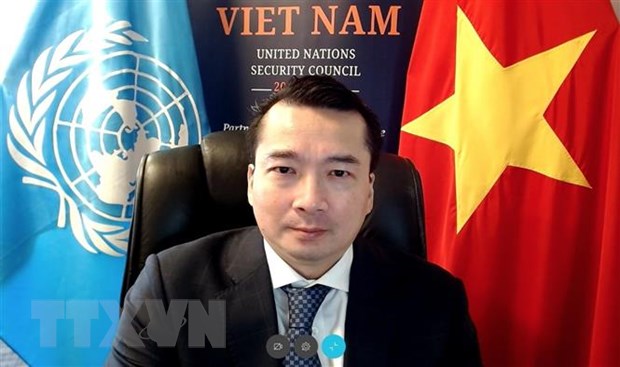UNSC adopts two resolutions on Libya, talks integrity of non-proliferation regimes
Vietnam, President of the United Nations Security Council (UNSC) for April, chaired a videoconference on April 16 to announce Resolution 2570 and 2571 related to Libya, both adopted unanimously.

Ambassador Pham Hai Anh, deputy head of Vietnam’s permanent mission to the UN
Resolution 2570 allows the UN Support Mission in Libya (UNSMIL) to support the ceasefire monitoring mechanism of October 23, 2020, in the country. It decides to deploy a UNSMIL ceasefire monitoring team which would require an initial maximum of around 60 civil personnel as recommended by UN Secretary-General António Guterres.
The resolution welcomes the recent progress in Libya, especially the establishment of the Government of National Unity and the relevant sides achieving consensus about the date of elections, on December 24 this year.
It urges the Government of National Unity of Libya and the parties concerned to take the steps necessary for organising the elections on schedule. It also underscores the importance of implementing measures for the disarmament, demobilisation, and reintegration of armed groups and the security sector reform in the country.
In Resolution 2571, the UNSC decides to renew the mandate of the Panel of Experts assisting the UNSC committee concerning Libya until August 15, 2022. It extends the authorisation of its previously imposed measures against the illicit export of crude oil and other petroleum products from Libya until 30 July 2022.
The Council further called on all parties to implement the ceasefire agreement signed on 23 October 2020 and urged its member states to respect and support full implementation of the agreement, including through the withdrawal of all foreign forces and mercenaries from Libya without delay.
Also on April 16, Russia and China held an Arria-formula meeting with other UNSC members to discuss the integrity of international non-proliferation regimes.
At this event, Ambassador Pham Hai Anh, deputy head of Vietnam’s permanent mission to the UN, stressed the need to augment efforts to fulfill obligations under the international treaties on non-proliferation and disarmament of weapons of mass destruction.
He held that treaty bodies and international organisations need to operate in line with international law, ensure objectivity and impartiality, promote international cooperation, and assist member states to realise their obligations.
To operate better, the personnel of international organisations need to meet the highest standards of professional knowledge and ethics and have knowledge about regional characteristics, Anh said, adding that it is necessary to create conditions for more representatives of developing countries to work at those agencies and organisations./.
VNA
 Malaysia's digital economy projected to reach 31 billion USD in 2024
Malaysia's digital economy projected to reach 31 billion USD in 2024
 Opportunity to enhance the position of the Global South
Opportunity to enhance the position of the Global South
 Thailand to build new bridge to Cambodia
Thailand to build new bridge to Cambodia
 Bulgaria charts new course with Vietnam on President’s upcoming visit: Diplomat
Bulgaria charts new course with Vietnam on President’s upcoming visit: Diplomat
 Seminar seeks ways to boost ASEAN - Latin America connectivity
Seminar seeks ways to boost ASEAN - Latin America connectivity
 Indonesia seeks India's help in health education
Indonesia seeks India's help in health education
 Indonesia named world's most generous country in 2024
Indonesia named world's most generous country in 2024
 Philippines: Over-4m-high floodwaters make thousands of houses submerged
Philippines: Over-4m-high floodwaters make thousands of houses submerged
 Singapore’s public sector records carbon reduction in 2023
Singapore’s public sector records carbon reduction in 2023
 Pressure facing the EU on its growth track
Pressure facing the EU on its growth track



